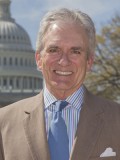 By Executive Director J. Brent Walker
By Executive Director J. Brent Walker
The 2014 American Values Survey tells us a lot about the American public’s view of church and state and the role of religion in politics. Released in September, the poll is the project of the Public Religion Research Institute (PRRI), a fine observer and chronicler of American attitudes “at the intersection of religion, values and public life,” according to its website. PRRI is headed by Robbie Jones — a Baptist, a graduate of Mississippi College and Southwestern Seminary, and a good friend of the Baptist Joint Committee.
The PRRI survey asked individuals what worries them more: the government interfering with people’s ability to “freely practice their religion” or religious groups “trying to pass laws that force their beliefs on others.”
The answer? Not surprisingly: 46 percent more concerned about one, 46 percent more concerned about the other.
The public is split pretty much down the middle on many social and political issues, no less on how we understand church and state and religion in American public life. It’s either red or blue, right or wrong, yes or no.
What a false dichotomy! The Baptist Joint Committee has been saying as much for nearly eight decades. We are a “both/and” outfit:
• Both religious liberty and separation of church and state. Indeed, the latter ensures the former.
• Both no establishment and free exercise. Our wise Founders put two clauses in the First Amendment on purpose to ensure religious liberty.
• Both the will of the majority (after all, ours is a democracy) and the rights of the minority (but it’s a constitutional democracy).
• Both sons of the Enlightenment and the children of God. Philosophy and theology came together to help pass the First Amendment. We tip our hats to both Johns — Locke and Leland.
• Both religion’s relevance to public life and the “no religious test” principle found in Article VI of the U.S. Constitution. Religion belongs in the political conversation, but it should not be used as a litmus test.
• Both accommodating religious exercise and looking out for the rights and well-being of others who are detrimentally affected. My right to swing my fist ends where your nose begins.
• Both opposing tax dollars for religious ministries and supporting tax exemption for religious organizations. Government should not give money; government should not take money away; government needs to be neutral toward religion.
• Both teaching about religion in the public schools and ensuring there are no school-sponsored religious exercises. The public schools must not indoctrinate religious beliefs, but they should educate students about religion’s place in our history and culture.
And on we could go with a dozen more.
We at the Baptist Joint Committee acknowledge and embrace the inevitable tension between these seemingly irreconcilable polarities – sometimes at the risk of not being able to speak quickly and forcefully on every issue that comes down the pike. But, this is where the Baptist Joint Committee needs to be in a “46/46 World” – a “both/and” voice of reason.
Because — as our friend Robbie Jones said in a recent Washington Post interview— when the public is asked about religious liberty and the separation of church and state separately, about two-thirds of those polled say they believe in both. Two out of three say they favor a strong separation of church and state and a robust religious liberty for everyone.
We must not intensify our polarized political culture by posing gratuitous either/or questions. In the context of church and state and religion in public life — along with so many other areas of apparent disagreement — we may find more common ground than we think. Where we do, we should reinforce that both/and consensus.
The Baptist Joint Committee plans to continue doing its part now and for the next eight decades.
From the October 2014 Report From the Capital. Click here to read the next article.





